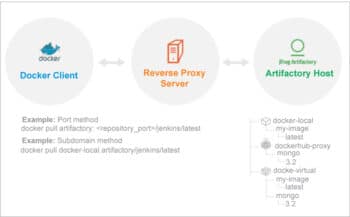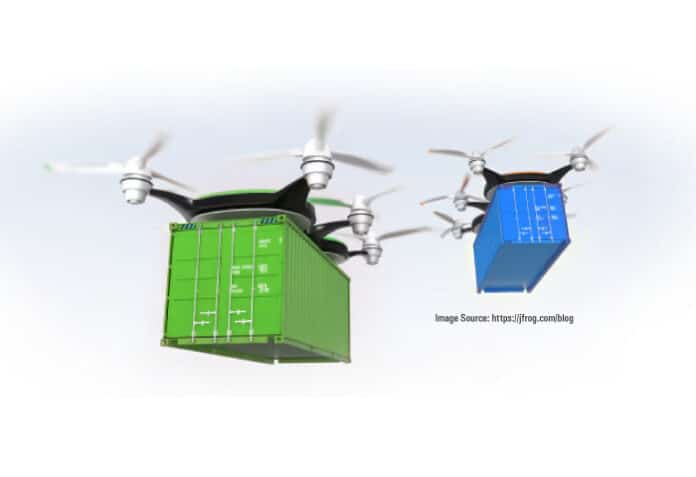In the world of containerisation, where Docker has become synonymous with efficient application deployment, Artifactory steps in as a robust repository manager, offering a comprehensive solution for Docker image storage and management. Let’s delve deeper into the intricacies of Artifactory’s Docker Registry and explore the features that make it an indispensable tool for organisations embracing containerised application architectures.
Artifactory serves as a centralised binary repository manager, storing Docker images as binaries. This approach ensures that Docker images are treated as valuable artifacts, benefiting from the same level of versioning, storage, and distribution control as other binary assets. By treating Docker images as first-class citizens in the repository, Artifactory facilitates efficient storage and retrieval, enabling organisations to manage their containerised applications more effectively.
Proxying remote Docker registries
Artifactory’s ability to proxy remote Docker registries is a game-changer, especially in scenarios where organisations rely on public Docker Hub images. By configuring Artifactory to proxy remote registries, such as Docker Hub, Artifactory acts as a local cache. This not only reduces latency by serving commonly used images directly from Artifactory but also ensures availability even if the external registry experiences downtime.
Caching and efficient distribution
Local repositories within Artifactory act as caches, storing Docker images locally after fetching them from remote repositories. This caching mechanism optimises distribution within an organisation, preventing redundant downloads and promoting faster image retrieval. The local repository becomes a trusted source for Docker images, enhancing both speed and reliability.
Docker repository formats
Artifactory supports both Docker V1 and V2 registry formats. This flexibility ensures compatibility with a wide range of Docker clients, accommodating the varying needs of different teams or projects within an organisation. This compatibility is crucial for organisations with diverse environments and Docker tooling preferences.
Security and access control
Ensuring the security of Docker images is a top priority, and Artifactory delivers on this front with fine-grained access control. Organisations can define access policies, specifying who can access and deploy Docker images. This level of control is crucial for maintaining a secure environment, especially when dealing with sensitive or proprietary containerised applications.
Integration with build tools
Artifactory seamlessly integrates with popular CI/CD tools, making it an integral part of the continuous integration and continuous deployment pipeline. Docker image management becomes an automated and repeatable part of the build process, promoting consistency and reliability in the software delivery life cycle. This integration ensures that the entire development and deployment workflow is streamlined and efficient.
Metadata and search
Artifactory captures extensive metadata about each Docker image, providing valuable insights into dependencies, build information, and more. This metadata is instrumental in organising and searching for Docker images efficiently. Developers and DevOps teams can leverage this information for better traceability, auditability, and understanding of the contents of each Docker image.
Docker layer versioning
To optimise storage space, Artifactory implements Docker layer versioning. This feature ensures that common layers shared across multiple images are stored only once. As a result, storage efficiency is significantly improved, and the impact of storage costs is minimised, making Artifactory an economical and resource-friendly choice for Docker image management.
Content trust and image signing
Security-minded organisations can further enhance the integrity and authenticity of their Docker images by leveraging Artifactory’s support for Docker Content Trust. This feature allows users to sign and verify Docker images, providing an additional layer of security in the containerised application deployment process.
High availability and redundancy
For enterprise-level deployments where high availability is critical, Artifactory supports clustering. Clustering ensures redundancy and fault tolerance, guaranteeing that Docker images are always available, even in the face of hardware failures or unexpected outages. This feature is essential for organisations with stringent uptime requirements (Figure 1).

Configuring Artifactory as a Docker Registry
Installation: Begin by installing and configuring Artifactory on the desired server or cluster based on the organisation’s requirements.
Create Docker repositories: Configure local, remote, and virtual Docker repositories within Artifactory, tailoring them to the specific needs of your organisation.
Proxy remote registries (optional): If your organisation relies on public Docker Hub images, configure Artifactory to proxy remote Docker registries to improve access speed and ensure availability.
Authentication and access control: Set up user authentication and finely define access control policies within Artifactory to ensure secure access to Docker images.
Integrate with CI/CD tools: Integrate Artifactory seamlessly into your CI/CD pipeline to automate Docker image management within your development and deployment workflows.
Content trust and signing (optional): For organisations prioritising enhanced security, enable Docker Content Trust and implement image signing to verify the authenticity and integrity of Docker images.
Monitoring and logging: Implement monitoring and logging solutions to keep track of usage, performance, and security events related to Docker images stored in Artifactory.
By adopting Artifactory as your Docker Registry, organisations gain not just a repository but a comprehensive solution for Docker image management. The features provided by Artifactory contribute to a more secure, efficient, and streamlined containerised application delivery pipeline, catering to the needs of both small-scale development teams and large enterprise-level deployments.
In conclusion, Artifactory’s Docker Registry capabilities extend beyond simple image storage, encompassing security, efficiency, and integration into modern DevOps practices. As the landscape of containerised applications continues to evolve, Artifactory stands as a versatile and indispensable tool for organisations striving to optimise their Docker image management processes.




